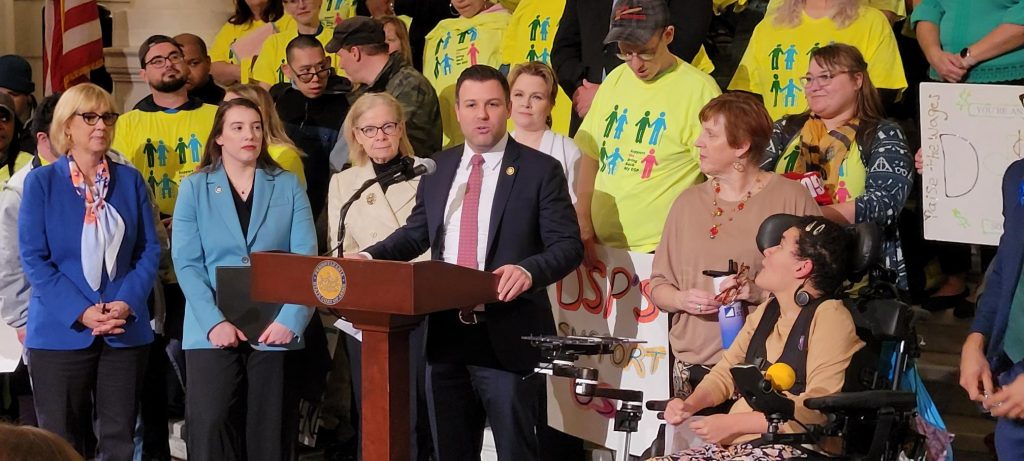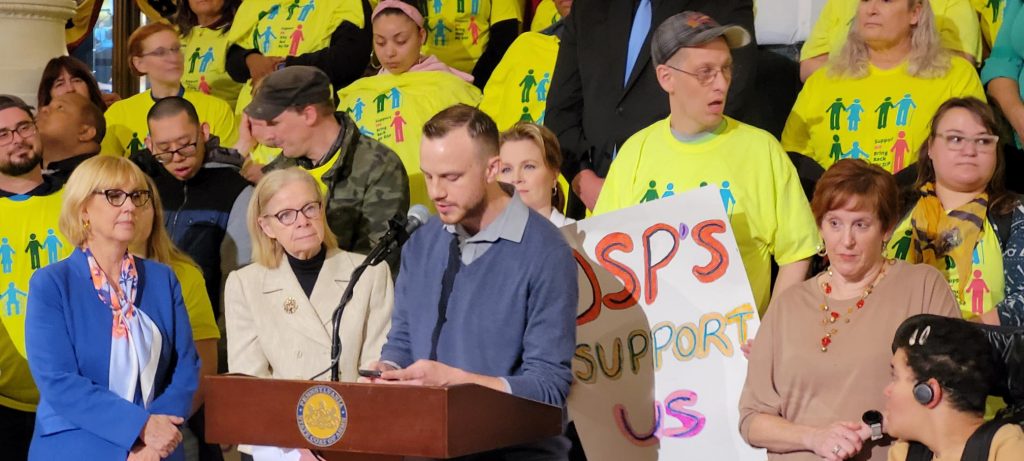Carol Ferenz
Direct Support Professionals, Providers Seeking $430 Million in PA Budget
Orchid Phoenix Announces Call for Participants for 2023 Emergency Response Training
Orchid Phoenix is an annual virtual tabletop exercise (VTTX) facilitated by the Office of Developmental Programs (ODP) to improve the understanding of emergency response concepts, identify opportunities or problems for your program, and build organizational, systemic resiliency.
Previously, participation was only available to Intermediate Care Facilities (ICF). For this year, ODP is expanding Orchid Phoenix and invites the following organizations to participate:
- ICF facilities;
- ICF provider organizations; and
- Home and Community-Based Services (HCBS) provider organizations.
The exercise time commitment will be for one four-hour period during the last two weeks of August 2023. ODP will ensure that the four-hour time commitment is respected. Once the call for participants is closed and the number of interested organizations is known, you will receive additional communication to schedule a specific date and time.
The call for participants for the 2023 Orchid Phoenix VTTX will close on June 30, 2023, at 5:00 pm. Please submit your interest in participation here.
The 2023 Orchid Phoenix VTTX will be a group discussion-based and mediator-facilitated exercise that will focus on four key target capabilities: Planning, Operational Coordination, Situational Awareness, and Critical Transportation.
- Participating organizations will be presented with an evolving scenario that summarizes key events occurring within a defined time period.
- Participating organizations will engage representatives from within their organization for a functional group discussion to identify an organizational response and think critically about unmet needs or future concerns.
- Each participating organization will share a summary of their functional group discussion to the other participating organizations.
Questions and concerns about the 2023 Orchid Phoenix VTTX or this communication may be directed to Douglas Trahey, MPA, Emergency Preparedness and Response Coordinator.
Registration for June IDD Community Summits on Wellness and Resiliency Now Open
ODP Announces New AAW Clinical Triage & Referral Process
In 2020, the Office of Developmental Programs (ODP) Bureau of Supports for Autism and Special Populations (BSASP) clinical team implemented a triage process to prioritize clinical support for participants and teams with high-risk needs. Currently, those participants deemed high-risk are assigned one clinical rep to consult with teams and ensure continuity of support. All other participant teams reach out to the clinical team as needed, but the clinical rep varies depending on the need at that time. The triage process remains fluid, and as participant’s needs change, risks increase, or new concerns arise, so will the level of clinical support. The triage levels are determined by multiple factors, including the information identified within the Periodic Risk Evaluation (PRE) and incident history. This triage process only applies to the ODP-BSASP Clinical Team and does not change any involvement, operational processes, or responsibilities of the Regional Office and the Regional Office Representatives.
New AAW Clinical Referral Process
In an effort to maximize the clinical team resources and triage team needs efficiently, the clinical team is implementing a new referral process for participant teams in the Adult Autism Waiver (AAW) in need of clinical support effective May 15, 2023. This new process will require Supports Coordinators (SCs) to complete an online form to share information about the type of support requested. View the full announcement here. The referral form is titled Referral for ODP/BSASP Consult for AAW Participants.
If you have any questions about this communication or process, please contact the Provider Support inbox.
Communication After Graduation: Resources for Adults With Communication Needs and Those Who Support Them
The transition from student to adult services is often referred to as a “cliff” where many needed services and service providers “drop off.” For individuals with complex communication needs, this often results in regression or stalled progress in communication, right when it is arguably more important to quality of life than ever. Penn State Health has focused their efforts on addressing this gap, teaching adults with limited functional communication to be able to communicate more with high tech augmentative and alternative communication (AAC). While providing outpatient speech and language therapy and applied behavior analysis services in their clinic, they then noticed another gap in services. The direct support professionals, parents, and other caretakers supporting the patients on a daily basis often had limited experience, knowledge, and confidence using the AAC themselves with the person they were supporting. In response to this concern, Penn State Health has been building resources to help caregivers become confident, competent communication partners using the AAC. They have been developing models of education and training that meet caretakers where they are, acknowledging their time and capacity limits. With these efforts, they hope to hear the voices of many more adults in this population – not just in the clinic, but also in the community.
Tuesday, June 30, 2023
10:00 am – 11:30 am
Register Here
Health, Human Services Organizations Rally at Capitol to Save Collapsing ID/A System
System For Individuals With Intellectual Disabilities, Autism Will Collapse Without Increased State Aid, Advocates Say
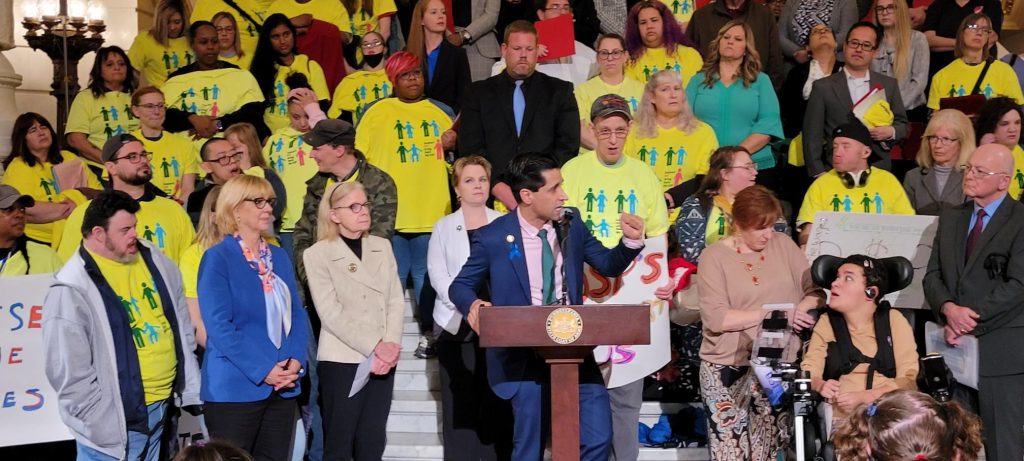 HARRISBURG, Pa. (May 3, 2023) – Advocates for and providers of services for individuals with intellectual disabilities and autism (ID/A) today urged the Pennsylvania General Assembly to increase state aid by $430 million to prevent a full collapse of the system. Prominent health and human services organizations gathered in the Capitol rotunda and said chronic underfunding and staffing shortages are forcing them to end programs and turn away individuals.
HARRISBURG, Pa. (May 3, 2023) – Advocates for and providers of services for individuals with intellectual disabilities and autism (ID/A) today urged the Pennsylvania General Assembly to increase state aid by $430 million to prevent a full collapse of the system. Prominent health and human services organizations gathered in the Capitol rotunda and said chronic underfunding and staffing shortages are forcing them to end programs and turn away individuals.
The $430 million funding request would generate a federal match that would allow providers to resume service to the 4,029 individuals who lost care in recent years. Without the 15-percent increase, providers say that 60,000 Pennsylvanians with ID/A would be at risk of losing or experiencing a reduction of essential services [read full press release].
June 2023 Certified Investigator Forum Announced
Don’t Miss Your Chance to Sponsor and Exhibit at the 2023 RCPA Conference!
Join RCPA as we host the 2023 Annual Conference, A Decade of Unity: Enhancing Lives and Shaping the Future, October 10–13. RCPA staff and the Conference Committee are excited to return to the Hershey Lodge, as we have new opportunities for sponsors and exhibitors to showcase their services! Be sure to complete the Sponsors, Exhibitors, and Advertisers brochure to reserve your spot, as space and opportunities are reserved on a first-come, first-served basis.
We already have a growing number of sponsors and exhibitors and wish to recognize the following organizations for their contributions and support for what is shaping up to be a packed week of sessions and events!
Platinum
Silver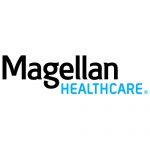 Bronze
Bronze
 Supporting
Supporting
Patron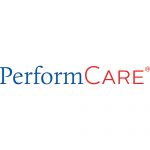 Exhibitors
Exhibitors
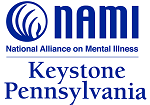 |
 |
||
As a reminder, sponsors, exhibitors, and advertisers who wish to be listed on the website, the mobile app, and in the conference program must submit all materials by September 8. In order to be considered for booth self-selection, a completed contract with payment must be submitted, and no reservation is considered complete without payment. If questions remain, please contact Carol Ferenz, Conference Coordinator.
















